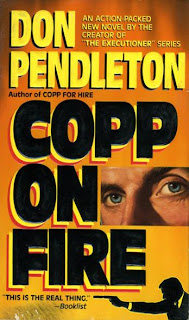
The work of Don
Pendleton has probably had has much impact on the modern thriller—specifically comic books and action-adventure novels—as any writer of his generation. His
The Executioner novels created the modern action story and spawned a myriad of copycats and wannabes; none of them nearly as good. He wrote these novels with a taut,
hardboiled style that created a violent, vivid and gritty world where vigilantes were civilizations final option—in a sense it was an update of the
hardboiled detective and Western stories from the pulp era, but with a modern sentiment of Vietnam-era cynicism and distrust. The character is archetypal and represents, in many forms, hope and redemption.
Pendleton wrote the first 38 novels—one or two of these early novels were written by Jim Peterson—in the still-running series and continued a close relationship with its direction well into the 1980s. He went on to write two private-eye series; Ashton Ford and Joe
Copp. The Ford novels are meta-physical in nature and lack the hard-hitting power of
Pendleton’s other work, but the
Copp novels are special. They are a throwback to the
hardboiled work of Mickey Spillane, but with a late-1980s Southern California mentality.
I recently read the second novel in the series,
Copp on Fire, for the first time in something close to twenty years—it was published in 1988—and really had a good time with it. Joe
Copp is a sentimental and cynical tough guy, not mention humorous as hell at times. He is a former police officer who went private to choose the cases he works—“I work for the work, and the luxury of picking my own.” He
doesn’t do divorce cases, chase ambulances, insurance investigations, or
skiptracing. He likes criminal cases and not much else.
The novel opens with
Copp worried about his next paycheck. He’s alone in his “no-town” strip-mall office in the San Gabriel Valley when the unlikely appearance of a limousine catches his attention. It rolls across the tarmac of the gas station at the corner and glides into the parking stall in front of
Copp’s office. Inside is a physically handicapped man named Albert Moore and he has a proposition.
He wants
Copp to take photographs—at predetermined times—of the entrance to a business he owns. He tells
Copp his employees are stealing from him and he needs to know the comings and goings.
Copp is uneasy about the set-up, but the envelope with $1,000 stuffed inside clinches the deal. Unfortunately everything turns inside-out when the building is bombed and
Copp is listed as the suspect, and to make matters worse, bodies start to pile-up and every cop in the valley is hot for him.
Copp on Fire is hard, fast and lean. The prose is taut and sparse, and the story is pitch-perfect—it is a Hollywood tale that includes more than a few illusions, exotic characters, sunny locations, betrayals and even a few surprises. It is told in Joe
Copp’s terse voice, and hard and cynical attitude. It is loaded with tough guy one-liners and brutal, monochromatic philosophy. A few of my favorites, that also work to illuminate the story and the character of Joe
Copp, are:
“Death is unlovely, sure, but life is sometimes even more so. And I have known crimes against the spirit far more terrible in their total effect than any trespass upon mere flesh.”
“I never met a man I didn't like, until he takes a whack at me. Then I love the bastard, after I whack him back, for reminding me that life ought to be lovelier than it usually is.”“No, I don’t have a Ph.D. in psychology and I’ve never sat on a philosopher’s stone, but I’ve cruised these streets and I’ve dealt first hand with most every variety of misery. Dan’t talk theory of plumbing to a guy who’s down there with his hands in it. And don’t talk social theory to a cop who lives the reality the profs write about.”
“I’m bad Joe Copp and I’m burning all over with the need to take it back to those sonsofbitches.
“F*ck sanctuary, I wanted blood.”
Copp on Fire is the follow-up to
Copp for Hire and it is better than the first. Don
Pendleton easily overcomes the few weaknesses of the first—the verbal posturing, over-talking the action—and really hits his stride. The prose is sharp, the dialogue crisp, and
Copp is perfect as societies outcast-crusader. It is a modern
hardboiled novel that will appeal to anyone who enjoys the genre or a swiftly told action thriller.
There are a total of six novels that feature Joe
Copp. The titles, in order of publication date, are:
Copp for Hire, Copp on Fire, Copp in Deep, Copp in the Dark, Copp on Ice, and
Copp in Shock.
I reviewed the first Joe
Copp novel in January 2007—click
Here to be magically transported.
























